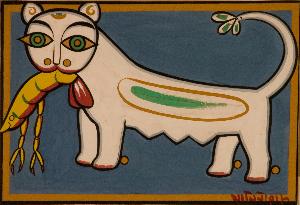Jamini Nath Roy
Jamini Nath Roy;Jamini Roy
Place: Beliatore
Born: 1887
Death: 1972
Biography:
Jamini Roy was a renowned Indian painter, born on April 11, 1887, in Beliatore, West Bengal. He is considered one of the most important figures in Indian modern art. Roy's artistic style was characterized by simplicity, elegance, and a deep connection to Indian folk art.
Early Life and Training
Roy was born into a moderately prosperous family of landowners. He was raised in an average middle-class, art-loving household that influenced his future decisions. At the age of 16, he moved to Kolkata to study at the Government College of Art, where he was taught by Abanindranath Tagore, a prominent Indian artist and educator.
Artistic Style and Influences
Roy's artistic style was influenced by the Kalighat paintings, a type of Indian folk art. He was also inspired by European modern art, but he eventually rejected Western traditions to focus on his own cultural heritage. Roy's paintings are characterized by their simplicity, flatness, and use of bold colors. Some of his notable works include:
- Portrait of a young girl, which showcases his ability to capture the essence of Indian folk art.
- Buste de Francoise, a painting that demonstrates his skill in portraiture.
- Painter and his model, a work that highlights his interest in exploring the relationship between artist and subject.
Awards and Recognition
Roy was awarded the Padma Bhushan in 1954, one of India's highest civilian honors. He was also a fellow of the Lalit Kala Akademi, a prestigious art institution in India.
Legacy and Impact
Roy's contribution to Indian modern art is immeasurable. His commitment to preserving Indian folk art traditions has inspired generations of artists. Today, his paintings can be found in museums and private collections around the world, including the National Museum of Korea and the Government College of Art. For more information about Jamini Roy's life and work, visit Wikioo.org or Wikipedia. His paintings continue to inspire art lovers and scholars alike, offering a unique glimpse into the world of Indian modern art.














